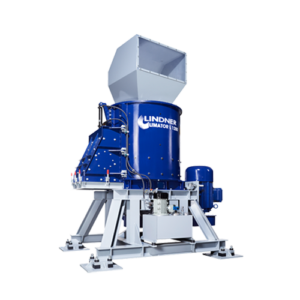In recent years numerous researches for the improvement of biogas plants have been made. Most of them aimed at obtaining higher gas yield and a better quality of gas in order to use it in existing gas networks. Also the reduction of the running costs of mixers and pumps as well as the prevention of floating layers have always been topics to be improved. Last but not least the researches focused on selecting an extended range of substrates and input materials.
Most of the tests made with conventional systems such as hammer mills, granulators and impact mills, led to very good results in some materials but showed unsatisfactory outcomes with others. With extruders for example very good outcomes were achieved but the high costs and the fact that it can be only used in processing renewable resources led to inefficiency.
A new generation of vertical crushers for processing of substrates brought new insights to the field of biomass treatment. These systems improve the costs as well as the variety of materials and operate on the principle of a blender with flexible grinding tools such as chains, hammers, etc. and they mostly work in interval operation. This kind of treatment is the only one that currently provides satisfactory results and therefore constitutes an improvement.
These facts were decisive for LINDNER-Recyclingtech, an Austrian shredding specialist, to develop an improved impact crusher called LIMATOR. This machine provides a rotating multi-element bracket to which movable crusher plates and crusher tools are attached. The charged substrates are broken up by the movable crusher plates and the crusher tools, as well as the momentum of the rotating substrates. This impact crusher system accomplishes gentle, yet maximum possible break-up of substrates and therefore a high gas yield. Through a variable adjustable slider the LIMATOR can optionally be operated continuously or in batch processing mode.
This innovative technology provides various advantages to improve the effectiveness of biogas plants. It mainly extends the range of substrates and input materials, leads to a higher gas yield and a better quality of the gas. A compact design and variable configuration opportunities as well as low purchasing and operating costs complement the new system in an ideal way.



